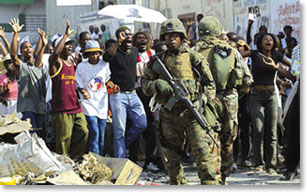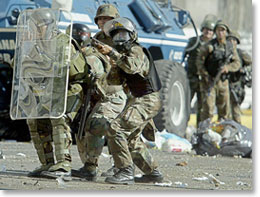Staff writer
- U.S. – Venezuela: From hostile rhetoric to the brink of confrontation (FCN, 02/04/2004)
- Black Caucus may call for hearings on Caribbean needs (FCN, 11/25/2003)
- Former government officials remember Grenada invasion (FCN, 11/05/2003)
- Washington is accused of ‘divide and rule’ in Caribbean (FCN, 10/05/2003)

UNITED NATIONS (FinalCall.com) – The officials of the United States, France, Canada and the United Nations who agreed to the intervention in Haiti attempted to channel the attention of the world to photo ops of soldiers bringing peace, democracy and human rights to a thankful populace. But, as The Final Call goes to press, demonstrations have turned violent against what ousted president Jean-Bertrand Aristide called an occupation of his nation, during a radio interview on the Pacifica Network.
The rosy rhetoric of U.S. officials attempted to obscure the darker, more pernicious fact about American presence in Haiti, which according to Bill Fletcher of the Washington, D.C.-based TransAfrica Forum and many labor activists, is fueled by the interests of some of the largest and most successful U.S. corporations, mostly in the textile business, to exploit Haitian workers.
“There is a growing worker and peasant movement in Haiti, which is putting pressure on the government for recognition,” Mr. Fletcher said. He explained that when President Aristide was first elected, he did not pander to the foreign commercial interests. The San Francisco Labor Council, in a resolution honoring the 200 years of Haitian independence, said Mr. Aristide’s landslide victory for the presidency in 1990 meant labor had an advocate in the palace.
In the 1997 book “Democracy Undermined and Economic Justice denied in Haiti,” its author Liz McGowan said that Mr. Aristide’s attempt to raise the minimum wage has been cited as one of the principal factors for the 1991 coup against his administration. According to Ms. McGowan, when Mr. Aristide was returned to power in 1994, he was under pressure from officials in the U.S. Agency for International Development (USAID), which provides economic aid to Haiti, not to raise the minimum wage. She said that Mr. Aristide did raise the wage from 15 gourdes (US $1) per day to 36 gourdes (US $2.40) per day. When he took office in 1990, the wage was 68 cents per day.
“He was elected by the people who shared his determination, in the face of crippling U.S. opposition to improve the conditions of the most poorly paid workers in the western hemisphere,” Ms. McGowan wrote.
Mr. Fletcher says that President Hugo Chavez of Venezuela was elected for the same reasons as Mr. Aristide. “The West hates President Chavez because he is talking about the fact that it is difficult for small nations to stand up to the Empire, so therefore, they need to establish a continental bloc that controls the maintenance of the labor and resources,” Mr. Fletcher said. For example, Mr. Chavez recently signed an agreement with the government of Guyana to aid in the exploration of oil deposits recently found in Guyana.
In the corridors of the UN, there is discussion on Haiti and the ramifications of its president’s removal for the world. “The old problems derived from colonialism and exploitation are compounded by new, pressing difficulties relating to the unjust and excluding international economic order,” commented Cuba’s deputy UN ambassador Orlando Requeijo Gual.

“It is crucial for the international community to express its solidarity with the people and democratic institutions of Haiti,” Venezuelan deputy ambassador Adriana Pulida Santana told The Final Call. That was the same day the Financial Times ran a photo of an anti-President Hugo Chavez demonstrator in Venezuela holding a sign that read: “Aristide is out, Mr. Chavez you are next.” Eduardo J. Sevilla Somoza of Nicaragua warned that the crisis in Haiti might spread to other nations of the region “one way or another.”
The UN ambassador for the Dominican Republic, Marino Villanueva Callot was angry when he told The Final Call that had the international community paid attention to his president, Hipolito Mejia in 2000, when he warned the UN about the socio-economic and humanitarian problems facing Haiti, the chaotic situation there now would have been avoided.
The ambassadors of Angola, Namibia and Lesotho briefly discussed with The Final Call their concerns. They said that what happened in Haiti was being watched closely in Africa. “What happened to their government could happen to any of us. We see this as very serious, and we want real answers,” the ambassadors said. They all agreed that what CARICOM had to say after their emergency meeting in Jamaica was of the utmost importance.
The Inter Press Service reported on March 3 that Jamaican Prime Minister P.J. Patterson, chairman of the 15-member Caribbean Community (CARICOM), wants the UN to investigate what happened to Mr. Aristide on the morning of February 29, when he and his wife and her brother left Haiti. Mr. Patterson also said that the CARICOM members want the Organization of American States (OAS) to ensure that the probe is carried out. Mr. Patterson added that what happened in Haiti constituted a “dangerous precedent” not only for Port-au-Prince, but also for democratically elected governments throughout the world, especially small states in the Caribbean.
The South African government has also sided with CARICOM in its position for the need to have the international community investigate what happened to the elected government of Haiti. Observers at the UN said that this is significant, because it shows the international community that Africans on the continent and in the Diaspora were uniting.
An attache from the UN Mission of Cote d’Ivoire told The Final Call, “We were with Aristide when they sent him back in 1994, because we believed he was the man of the people. Look what is happening to my president. Outside forces are trying to dictate to us who to follow, and we will no longer allow that to happen,” he insisted.
But an editorial in the Jamaica Gleaner Online on March 5 said that CARICOM leaders were limping back to the UN, admitting that its initiatives to solve Haiti’s crisis gave way to the realities of “Big Power politics.” The editorial said that CARICOM has been effectively sidelined for now at the UN, left only to investigate the circumstances of Mr. Aristide’s departure.
But activists worldwide say that the people of poor nations are beginning to understand that economic oppression and military repression are flip sides of the same coin. “The economic terrorism inflicted on the poor that accompanies corporate globalization starts with repressive military approaches,” writes the Latin America Coalition, an association of national and local U.S.-based grassroots working in the Caribbean and Latin America.
The Latin American Solidarity activists say they will converge on Washington, D.C. from April 22 to 24 to demonstrate at the semi-annual meetings of the International Monetary Fund (IMF) and the World Bank. For the past two weekends, the International Action Center has sponsored anti-coup demonstrations in Brooklyn, NY and a protest outside of the UN. Former U.S. attorney general and founder of the International Action Coalition Ramsey Clark rendered some analysis for reporters.
“The neo-liberal policies that are now being placed in position in Haiti, which are being forced on the people of Haiti by foreign governments through the IMF and the World Bank, which are being touted as some type of new economic structure is not going to benefit them economically,” Mr. Clark said. He said that was true for all of the Caribbean Basin, Latin America and Africa.
According to Mr. Fletcher, there is a growing awareness of the negative effects the IMF and the World Bank have on small nation economies, because they squeeze governments to downsize and privatize their industries which in turn causes economic and political destabilization. Also, that IMF reforms tend to support U.S. strategic and foreign policy objectives. “Haiti is of minimal strategic significance, but has a profound ideological position in the grand scheme of things,” Mr. Fletcher said.
He said privatization efforts go hand-in-hand with union-busting and result in the weakening of social movements overall.
There are un-substantiated reports that Mr. Aristide was reneging on his deal to allow the market economy policies (the so-called Washington Consensus) to continue in Haiti. Observers believe that the West had deep foreign policy concerns with trends in Latin America, where regimes supportive of U.S./IMF/World Bank economic policies had been removed by revolt.
President De La Rua of Argentina had to be plucked from the roof of his palace by helicopter and flown into exile by the force of violent street protests, as workers tried to rise up from the ashes of the havoc wrought by the IMF. The same is true in Bolivia; and in Mexico, there is a growing economic justice movement in the states of Chiapas, Guerrero and Oaxaca.
Activists continue to warn that the new agreements such as the Free Trade Agreement of the Americas exploits workers in Mexico and in fact leverages them against workers in Haiti, El Salvador and Brazil by corporations seeking tariff-free access back into U.S. markets.
“We have to understand how inter-connected economies are today. For instance, U.S. farm subsidies in the mid-1990s, to the tune of $30 billion, all but shut down production in the rice-producing and livestock farms in the northwest area of Haiti,” Mr. Fletcher stressed.
He added that Blacks in America need to become more aware of the issues facing workers in Africa, who are victimized by sweatshops that exploit the labor of men, women and even children under the age of 10. He said that American workers must understand that the rights of workers to organize to improve their conditions are being ignored by the international community.
Noam Chomsky, professor of Linguistics at MIT, said that “the threat of a good example solicits measures of retaliation that bear no relation to the strategic or economic importance of the country in question.”
“Aristide is gone, Mr. Chavez you are next.”












